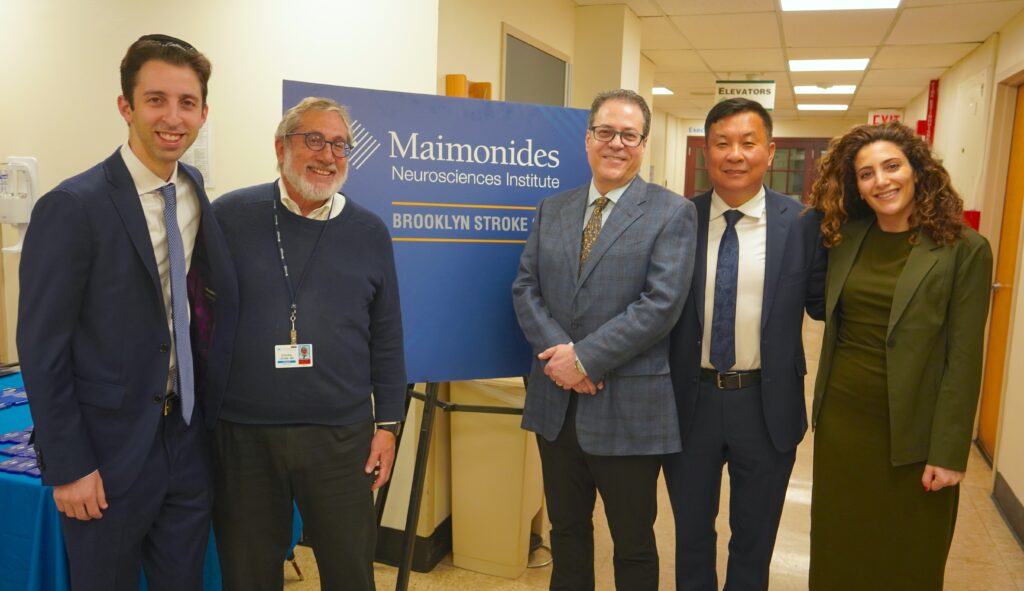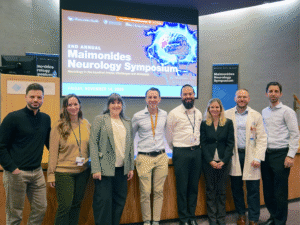The 2025 Brooklyn Stroke Symposium, held at Maimonides Medical Center on May 15, marked the conference’s fifth year bringing together experts from the field for a day centered around advancing stroke care. Presented jointly by the Jaffe Comprehensive Stroke Center at Maimonides and SUNY Downstate Health Sciences University Department of Neurology, the symposium was the largest continuing medical education event ever held at Maimonides. Almost 1,000 attendees registered, reflecting the significant growth this conference has achieved since its inception. The symposium has not only become a mainstay for knowledge sharing, idea exchange, and progress development of stroke care for regional professionals, but has also grown to impact clinical practice across the nation and the globe.
“The quality, the relevance of topics covered, the depth of discussion, and the leadership of the experts from Maimonides and beyond who share their work and expertise are what makes our symposium unique, drawing in national and international professionals who are invested in providing the best patient care,” said Q. Tony Wang, MD, PhD, Program Director at the Jaffe Comprehensive Stroke Center at Maimonides.
Importance of Individualized Care and Centering Understudied Patient Populations
According to Dr. Wang, a theme throughout this year’s presentations is the increasing emphasis on individualized care for stroke patients, and the utilization of this knowledge to prevent recurrent strokes.
“This year, we focused on the unknowns, controversies, and rarities of stroke care, including cryptogenic strokes, retinal and spinal cord strokes, as well as stroke in understudied populations like women, children, and individuals who have migraines,” he said. “These are some of the most challenging and unusual cases of stroke. It’s critically important for us to be able to understand each patient’s unique conditions, risk factors and underlying etiologies of stroke for therapeutic purposes as well as secondary prevention. We focus on the clinical management guideline adoption tailored to patient’s individual profile, in addition to research driving future clinical paradigm shifts.”
Novel Stroke Treatments Driven by the Heart-Brain Connection
Since Dr. Wang began his tenure as director of the stroke center six years ago, a major priority has been collaboration across disciplines and specialties at Maimonides.
“Cardiology, neurosurgery, radiology, critical care, vascular surgery, cardiothoracic surgery are all very important collaborative disciplines reinforcing our stroke program care,” said Dr. Wang. “We are in constant,real-time communication to provide the best multidisciplinary advice to achieve the best patient outcomes.”
The Heart-Brain Initiative is a critical collaboration at Maimonides, addressing complex cardiac and vascular conditions that can contribute to stroke risk. Robert Frankel, MD, Vice Chair, Cardiology & Director, Interventional Cardiology, presented on this unique approach.
Dr. Frankel began by discussing congenital structural heart defects, including atrial septal defects (ASD) and patent foramen ovale (PFO), and their potential to significantly increase stroke risk. PFO particularly is estimated to affect a significant portion of young patients who have experienced cryptogenic stroke¹. Though rare, these defects can allow clots, normally benign, to pass through from the right side of the heart to the left, where they can be ejected from the aorta and reach the brain, causing a stroke. Minimally invasive endovascular PFO closure stops blood shunting through the PFO, thereby preventing strokes. Maimonides is one of the first hospitals in Brooklyn—with nearly a decade of experience—performing percutaneous PFO and ASD closures.
With hypertension also a major risk factor for stroke, Dr. Frankel discussed Maimonides’ 2024 achievement of becoming the first hospital in Brooklyn to offer a groundbreaking renal artery denervation (RDN) procedure to treat refractory hypertension.
“Our team at Maimonides has performed 10 minimally invasive RDN procedures since launching this program,” said Dr. Frankel. “This is proven to drop blood pressure by 10 to 20 mm, and this reduction is durable and lasting — the nerves do not grow back — with the risk of major adverse events less than 1%.”
Finally, Dr. Frankel discussed left atrial appendage closure techniques, which address persistent atrial fibrillation (AFib) and its associated stroke risk.
“More than 90% of the strokes we see with cardiac cause originate in the left atrial appendage,” he said. “Sealing this off with closure implants is more effective than common AFib treatments like anticoagulants, and has fewer risk factors, especially for patients for whom blood thinners pose an excessive safety risk, like younger patients who want to stay active.”
Stroke in Women: An Underappreciated Health Issue
Leah Croll, MD, Attending Neurologist at Maimonides and Assistant Professor of Neurology at SUNY Downstate, presented on stroke in women. As the third-highest leading cause of death in women, stroke can manifest very differently from stroke in men in terms of risk factors, clinical presentations, and outcomes, despite about 55,000 more women than men having a stroke each year².
“This is an underrecognized and underappreciated women’s health issue,” she said. “Stroke affects women differently than men, primarily because of their unique biology and longer lifespan, partially due to the protective effect of estrogen on blood vessels.”
Dr. Croll discussed stroke risk factors unique to women, including early menopause or a reproductive lifespan under 30 years, history of adverse pregnancy outcomes like preeclampsia, endometriosis, migraine with aura, and menopause-related factors like incidence of vasomotor symptoms. Pregnancy also puts women at higher risk of stroke, and the incidence of pregnancy-associated stroke has actually increased over the past 30 years.
In terms of presentation, Dr. Croll explained that women are more likely to have nontraditional symptoms, like altered consciousness and changes in mental status, a phenomenon which often delays evaluation and treatment. They are also more likely to present with stroke mimics, like complicated migraine, seizure, neoplasm, metabolic disorders, and more.
“Cardiologists are doing a great job in recognizing cardiac emergencies in women earlier on, when conditions are most treatable,” Dr. Croll said. “As neurologists, we need to likewise do a better job of recognizing stroke in women, so we can close the gap in mortality, functional recovery, and quality of life for women post-stroke. Learning sex-specific risk factors and taking preventive action is also the first step to stopping these emergencies before they happen.”
Stroke in Migraineurs
Murray Choueka, MD, Director of Headache Medicine at Maimonides, presented on the complex relationship between stroke and migraine. Though these conditions sometimes mimic each other, they do not share the same causes. Dr. Choueka explained that migraine with aura and migraine without aura have very differentlinks to stroke.
“While migraine without aura shows no increased risk for stroke, aura indicates that a patient is at increased risk for stroke,” said Dr. Choueka. “There has also long been an understanding that patients with aura should not be prescribed estrogen-containing contraception, but the absolute risk for ischemic stroke in patients taking low-dose estrogen OCPs is likely very small, and may not warrant discontinuation of use if a patient does not want to switch birth control methods.”
He also discussed migrainous infarction, or the occurrence of a stroke during a migraine, particularly during a period of prolonged aura. Because this condition is extremely rare, Dr. Choueka explained, it is very difficult to determine the existence — or the direction — of causality.
Cryptogenic Stroke
Mitchell Elkind, MD, MS, FAAN, FAHA, Chief Clinical Science Officer for the American Heart Association, presented on Cryptogenic Stroke and updates from the ARCADIA trials. Cryptogenic strokes are ischemic strokes for which a cause cannot be determined and make up roughly one-third of strokes. The landmark ARCADIA trials, conducted across more than 200 institutions across the United States and Canada, sought to find whether blood thinners are more effective than aspirin for patients with cryptogenic stroke who have evidence of atrial cardiopathy, a general term for functional or structural heart conditions shown to be connected to cryptogenic stroke³. The trial concluded that blood thinners were not more effective than aspirin in preventing recurrent stroke although there was no difference in the risks of hemorrhages and death between the two either4.
In addition to Dr. Elkind, the symposium brought in the perspectives of several other field experts from outside Maimonides, including Levi Dygert, MD, Director of Stroke & Vascular Neurology for NYU Langone Health, who presented on central retinal artery occlusion. World-renowned neurointerventionalists Philippe Gailloud, MD, Director, Division of Interventional Neuroradiology at The Johns Hopkins University, and Alex Chebl, MD, Director of the Henry Ford Comprehensive Stroke Center and Director of Henry Ford Health’s Division of Vascular Neurology, presented on spinal cord stroke and carotid revascularization, respectively.
Five Years On, Symposium Continues to Grow Alongside Maimonides Stroke Program
With about 6,400 people dying from stroke in New York State alone every year, stroke continues to be a major cause of mortality5. Risk, cause, recovery, intervention, rehabilitation, and outcome are factors that vary widely by patient, and the goal of this year’s symposium was to help providers better understand these variables, build upon current knowledge, and address their importance in patient care to improve outcomes and reduce the risk of future strokes.
“After starting the symposium in the midst of the pandemic, we have expanded a lot with each year and furthered our reach both in the region and the field at large,” said Dr. Wang. “Most importantly, our stroke program and our patients have benefited greatly from our commitment to leadership and continuing education. Last year, we had our highest patient volume in our history, a tremendously exciting milestone for the program’s development. We look forward to continuing to improve our program quality with a focus on individualized care, novel treatment offerings, and robust multidisciplinary collaboration.”
Read more about the more about the 2025 Brooklyn Stroke Symposium and other presenters, and more about the Jaffe Comprehensive Stroke Center. To make an appointment or refer a patient, call (718) 283-7670.




